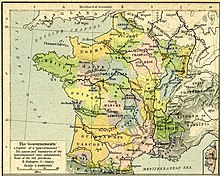Kingdom of France
Appearance

The Kingdom of France (French: Royaume de France), was a medieval and early modern monarchy in Western Europe, the predecessor of the modern French Republic. It was one of the most powerful states in Europe, a great power since the Late Middle Ages and the Hundred Years' War. It was also an early colonial power, with significant possessions in North America.
| This history article is a stub. You can help out with Wikiquote by expanding it! |
Quotes
[edit]- You, men of England, who have no right to this Kingdom of France, the King of Heaven orders and notifies you through me, Joan the Maiden, to leave your fortresses and go back to your own country; or I will produce a clash of arms to be eternally remembered. And this is the third and last time I have written to you; I shall not write anything further.
- Joan of Arc, Third Letter to the English at Orleans; May 5, 1429, translated by Allen Williamson, 2000-04. (online).
- On 1 August 1779, Pierre Reynes and his son Mathieu met the royal notary of the small south-western town of Villefranche-de-Lauragais to enter into a contract with the ‘high and powerful seigneur’ the Marquis d’Hautpoul, through his agent, Jacques Maurel. The farm the illiterate peasants were rent ing was a considerable one – about 30 hectares – and produced about a hun dred setiers of wheat (20 setiers would feed a family of five) and a wide array of livestock, vegetables and other produce. This was, however, a sharecropping contract: the seigneur took 20 setiers in advance – whatever the volume of the crop – and half of the rest; after setting aside seed for the next year, the Reynes would be left with 15 setiers, less than their family needed. They were rigidly tied to a three-field system (maize and vegetables, wheat, fallow) and, while the proceeds from livestock were also divided, any extra forage had to be provided by them. Similarly, all the farm implements were the lessees’ responsibility. They were to buy young pigs, though the seigneur’s agent was to have half; in addition, they were to provide 108 chickens and capons and 600 eggs yearly. The lease was for one year only; should the Reynes not ‘do everything neces sary’ to be good husbandmen (‘bons ménagers et bons pères de famille’), it would not be renewed.
- Peter McPhee, A Social History of France 1789–1914 (2004), Ch. 1: France in the 1780s
- The Englishman, in eleven years, gets three bushels more of wheat than the Frenchman. He gets three crops of barley, tares, or beans, which produce nearly twice as many bushels per acre, as what the three French crops of spring corn produce. And he farther gets, at the same time, three crops of turnips and two of clover, the turnips worth 40s. the acre, and the clover 60s. that is 121 for both. What an enormous superiority! More wheat; almost double of the spring corn; and above z 20s. per acre per annum in turnips and clover. But farther; the Englishman's land, by means of the manure arising from the consumption of the turnips and clover is in a constant state of improvement, while the Frenchman's farm is stationary.
- Arthur Young (1791), Travels during the years 1787, 1788, and 1789: : undertaken more particularly with a view of ascertaining the cultivation, wealth, resources, and national prosperity of the kingdom of France, Volume 1, p. 344; Cited in: Jackson Spielvogel (2011), Western Civilization: Alternate Volume: Since 1300, p. 296
External links
[edit] Encyclopedic article on Kingdom of France on Wikipedia
Encyclopedic article on Kingdom of France on Wikipedia Media related to Kingdom of France on Wikimedia Commons
Media related to Kingdom of France on Wikimedia Commons Kingdom of France travel guide from Wikivoyage
Kingdom of France travel guide from Wikivoyage
